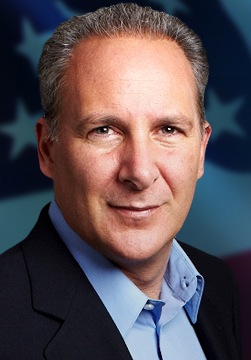Greenspan Walks Policy Tightrope
In early morning trading the U.S dollar rallied in anticipation that Alan Greenspan's Congressional testimony would include an upbeat forecast for the U.S. economy and hope for a narrowing of its fiscal and trade imbalances. As should have surprised no one, Greenspan did not offer these soothing words, and the dollar's rally fizzled. Instead Greenspan delivered a sobering, yet still sugar-coated, assessment of the significant structural problems confronting the U.S. economy. Clearly, Greenspan has perceived the contours of the cliff over which the U.S. economy now teeters. His comments seem designed to allow him to claim "I told you so" when it finally falls off, without actually having to bear the responsibility for pushing it over the edge.
The following is a summary of some of his more interesting comments.
Greenspan said that there is no difference between federal debt owed to foreigners and debt owed to Americans. This overlooks the fact that interest payments made to foreigners represent an actual drain on national income, while interest payments made to other Americans merely represent an internal redistribution of that income.
Greenspan said that our lack of domestic savings requires us to borrow from foreigners to finance our investments. While this is true, it overlooks the fact that most of America's borrowing has been to finance consumption not investment. The difference is that debts incurred to finance capital investments are self-liquidating, as they generate the cash-flow necessary to pay the interest and retire the principle, while debts incurred to finance consumption are not, and merely further impair the solvency of the borrower.
Greenspan's claim that foreigners are buying U.S. debt because it offers superior returns completely ignores the fact that foreign private investors have actually been reducing their holdings of U.S debt. The dramatic increase in net foreign holdings is wholly a function of increased buying by foreign central banks, which are perusing political, not financial, objectives.
Greenspan testified in favor of private social security accounts because such accounts would increase national savings. This claim requires you to ignore the offsetting reduction in national savings implied by the increased budget deficits necessary to fund the transition to such accounts.
Greenspan rightly criticized the U.S. for its lack of savings. However, he ignored his role in perusing monetary policy specifically designed to discourage savings and promote consumption. It seems disingenuous for Greenspan to criticize a situation which he deliberately helped to create.
With respect to financing budget and current account imbalances, Greenspan's explanation of the difference between a "crisis" and a mere "serious problem" was highly reminiscent of former President Clinton's parsing of the word "is." The way Greenspan defines it, a problem only becomes a crisis after it is too late to do anything about it. It is similar to Wall Street analyst's practice of waiting for a bankruptcy filing to downgrade a stock from "strong buy" to "hold."
Greenspan's praise of how well the Social Security chain-letter worked before it began running out of chain ignores the fact that all ponzi-schemes work well for those who get in early. It is precisely because pyramid schemes only benefit those few at the top, at the expense of a far greater number at the bottom, that they are illegal in the first place.
Greenspan reluctantly admitted that the U.S. government had over-promised Americans with respect to future retirement benefits, while failing to address the implications of this admission.
Greenspan's praise of the U.S. economy for its "flexibility" and its 'ability to deal with economic shocks," ignores the fact that this "flexibility" actually reflects the ability and willingness to go deeper into debt, and that the "shocks" have not been "dealt with," but merely postponed and exacerbated.
Greenspan's claim that foreign purchases of U.S. debt have only "modestly" reduced U.S. interest rates, ranks as one of the most dramatic understatements of the millennium.
Greenspan's assessment that the trade deficit merely reflects American's new-found preference for foreign goods is ridiculous. What Americans prefer is high-quality, low-cost, goods. The fact that such goods are no longer produced domestically is a major problem, reflecting a substantial erosion of America's industrial base, and portending a significant reduction in the future standard of living of its citizens.
3 March 2005
Peter Schiff
C.E.O. and Chief Global Strategist
Euro Pacific Capital, Inc.


















